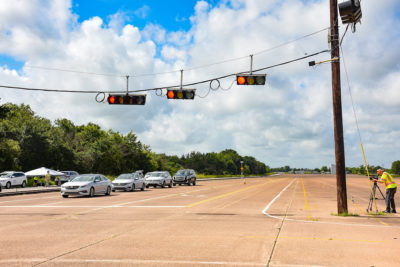
Texas A&M Transportation Institute (TTI) researchers conducted a field demonstration of the Traffic Optimization for Signalized Corridors (TOSCo) project March 30–April 1 in Houston, Texas. Participants in the demonstration included the U.S. Department of Transportation, the National Transportation Safety Board, the National Highway Traffic Safety Administration, and the American Association of State Highway and Transportation Officials Pooled Fund study.
The Houston field demonstration was part of a larger, multi-phase project. The goal was to test how connected vehicles — and a connected environment at a traffic signal — could increase safety and efficiency for vehicles on the road. After creating a concept of operations, TTI researchers developed a system and tested it at TTI’s Smart Intersection at the RELLIS Campus. TTI built the infrastructure for the project, and Crash Avoidance Metrics Partners LLC (CAMP) provided vehicles.
After testing at the RELLIS Campus, the research team evaluated the TOSCo system in the field. Going into the field allowed researchers to assess the system’s ability to handle real-world conditions, such as multiple vehicles in different lanes approaching an intersection, and a variety of scenarios with drivers making decisions about slowing down or speeding up near an intersection. The research team operated the TOSCo system in a test bed encompassing 13 corridors in Houston.
“Connected intersections continue to increase in use across the United States,” says Kevin Balke, principal investigator and senior research engineer. “The field demonstration in Houston gave us the opportunity to contribute to that research. Testing the system in the field provided data on driver behavior that informs the project’s results and potential benefits.”